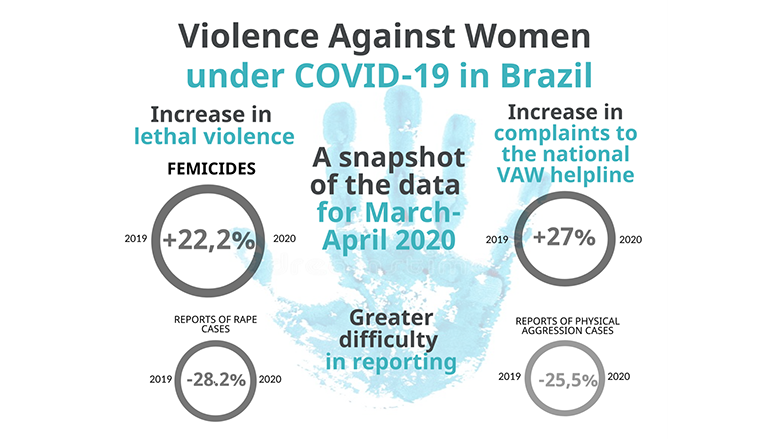Emerging evidence from COVID-19 impacts as well as lessons from past epidemics suggest that significant risks of VAW increase in these contexts, especially in countries with weak health systems, weak rule of law, and already high levels of VAW and gender inequality. Recent reports indicate that this is also the case in Brazil. Data from the first two months of confinement measures (March-April 2020) point to a 22% increase in femicide and a 27% increase in complaints to the national VAW helpline, when compared to the same period of 2019.
Increased economic stress due to income losses, anxiety in face of the epidemic and fear of contagion, social isolation and mandatory confinement with potential abusers and with children at home indicate that women and girls are likely to be more exposed to intimate partner violence and sexual exploitation and abuse during this period. While risks increase, access to health, security and justice sector services provided to survivors may be limited due to de-prioritization of funding, closed facilities and restrictions on public mobility.
This note aims at providing support to federal and subnational governments in understanding the increased risks of VAW in the country under COVID-19 and providing the most appropriate responses in the short, medium and longer term. It points to evidence of epidemic-related risk factors connected to increased levels of VAW, trends of VAW during the COVID-19 epidemic in Brazil, policy measures and interventions implemented globally to mitigate adverse impacts, as well as response fforts that have been put in place both by governments and civil society organizations. It also compiles existing data available on increased VAW in the country since the onset of the COVID-19 pandemic, pointing to the main (direct and indirect) links between the two.
While aiming to provide timely support during the ongoing pandemic, high frequency data available and the restrictions imposed by the present-day situation on data collection make it hard to assess the effective impact of such measures, interventions and response efforts. Their implementation should be accompanied carefully to provide lessons for others and potential future pandemics. As such, this is intended to be a living document that will contribute to the global knowledge on how countries are responding to VAW-COVID-19 related challenges by documenting actions in this sector. Overall, findings should be considered preliminary and will be updated based on consultations with Brazilian counterparts from government, civil society and experts.
This note was prepared by Gabriela Bastos, Flávia Carbonari, and Paula Tavares. The team would like to thank Pablo Ariel Acosta, Alberto Coelho, Maria Gonzalez and Juliana Braga for their invaluable contributions and support.
